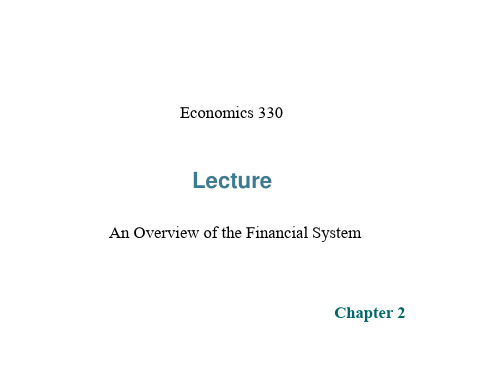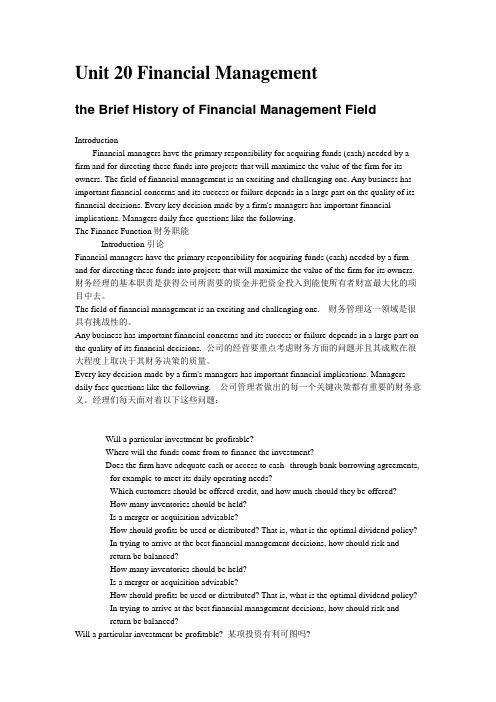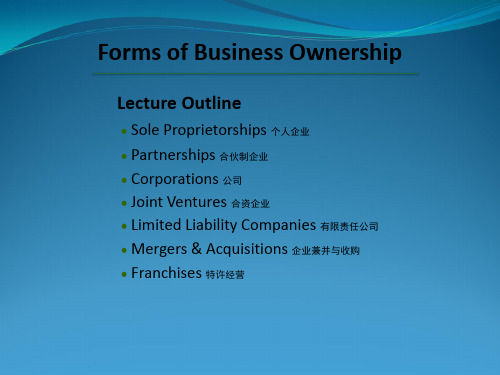Lecture 1 The Corporation and The Financial Manager
- 格式:docx
- 大小:79.76 KB
- 文档页数:4



Unit 20 Financial Managementthe Brief History of Financial Management FieldIntroductionFinancial managers have the primary responsibility for acquiring funds (cash) needed by a firm and for directing these funds into projects that will maximize the value of the firm for its owners. The field of financial management is an exciting and challenging one. Any business has important financial concerns and its success or failure depends in a large part on the quality of its financial decisions. Every key decision made by a firm's managers has important financial implications. Managers daily face questions like the following.The Finance Function财务职能Introduction引论Financial managers have the primary responsibility for acquiring funds (cash) needed by a firm and for directing these funds into projects that will maximize the value of the firm for its owners. 财务经理的基本职责是获得公司所需要的资金并把资金投入到能使所有者财富最大化的项目中去。



FinanceChapter1 IntroductionWhy Study Money, Banking, and Financial Markets An Overview of the Financial SystemWhat Is Money?Lecture 1Why Study Money, Banking, and Financial Markets?•Course Overview•Why Study Financial Markets?•Why Study Financial Institutions and Banking?•Why Study Money and Monetary Policy?Learning Objectives:How to construct a preliminary financial knowledge system Types of financial marketsTypes of financial institutionsHow the central bank implement monetary policyWhat is monetary theoryPart 1Why Study Financial Markets?1.1 Financial MarketsFinancial Markets (P2):Markets in which funds are transferred from people who have an excess of available funds to people who have a shortage.金融市场:资金从那些可用资金过剩的人转移到资金短缺的人的市场。
Why study financial markets?•Channel funds from savers to borrowers, thereby promoting economic efficiency•Affect personal wealth and behavior of business firms1.2 The Bond Market and Interest RatesBond (P3) is a debt security that promises to make periodic payments for a specified period of time.债券:是一种债务性证券,承诺在一个特定时间段内定期支付。
Lecture 1The Corporation and The Financial Manager The Role of the Financial Manager
1. Capital Budgeting /Investment Decision
2. Financing Decision
∙Raising money that the firm needs for its investments and operations.
∙Capital Structure: the mix of long term debt and equity financing
(1) Cash raised from investors (Financing)(2) Cash invested in firm(Investment) (3) Cash generated by operations
(4a) Cash reinvested (Investment)(4b) Cash returned to investors (Dividend) Types of Firms
A.美国
1.Sole Proprietorships独资经营公司
∙Have only one owner
∙Easy to set up; Total control
∙Limited lifetime(不超过所有者的寿命,转让难)
∙Unlimited liability
优点:无需备案即可成立;极低或者无需成立费用;没有正式的管理架构;
转嫁税收实体,所有收入仅按所有者个人所得课税。
缺点:为其所有者提供企业相关责任的法律保护,一律承担无限个人责任;
筹资及融资困难;雇员福利不享受免税额
2.Partnerships
∙General partners普通合伙制: Partners haveunlimited liability
合伙人之间承担连带责任。
盈亏由各合伙人自行作为个人收入报税。
∙Limited partners 有限合伙制(ex.私募基金) Partners have limited liability
至少有一个普通合伙人和一个有限合伙人,须在州政府注册登记。
其缴税和普通合伙制相同。
普通合伙人负责对企业进行管理,对债务承担无限责任。
有限合伙人没有管理权对企业也没有控制,对于债务的承担只限于其出资额。
3.Limited Liability Companies (LLC) 有限责任公司
∙A limited partnership without a general partner
∙Owners have limited liability
有限责任公司的所有人或出资人,在法律上不称作股东shareholder,而是称作为成员member。
成员拥有所有权的形式是根据投资的比例持有法定权益
interest,而不是stock。
但是成员根据实际需要,可以拥有优先份额或法定权益preferred ownership interest
4.Corporations股份公司
∙A legal entity.
∙Solely responsible for its own obligations
公司实体与其所有者相分离,股东可以私人控股、封闭式控股或者可以向公众出售股权(上市)。
股东的财产受到有限责任的保护,其个人不承担公司债务。
优点:公司独立于所有者而经营,所有人免于承担公司业务的相关责任;
极易筹集资金;专业管理体系;没有存续期限可以永久经营
缺点:组成公司、开展股东会议和维护公司形象的成本较高;
需要成立董事会会议、股东会议,和正式章程;
收入双重课税Corporate tax on profits +Personal tax on dividends
B.中国
《中华人民共和国公司法》
依照本法在中国设立的有限责任公司和股份有限公司。
注:国有独资企业或国有控股企业都不是公司组织.
∙有限责任公司:股东(五十个以下)以其认缴的出资额为限对公司承担责任∙股份有限公司:以其认购的股份为限对公司承担责任(2~200人发起,须有半数以上的在中国有住所)
∙无限责任公司:全体股东对公司债务承担无限连带清偿责任。
∙两合公司:部分承担无限连带责任,部分承担有限责任
《中华人民共和国合伙企业法》
普通合伙企业+有限合伙企业
国有独资公司、国有企业、上市公司以及公益性的事业单位、社会团体不得成为普通合伙人。
其他企业(含有限责任公司)可以
Goals of The Corporation
A.证券:债券和股票以及其它有价证券
∙广义指证据证券、凭证证券和有价证券,
∙狭义指有价证券,包括钞票、邮票、印花税票、股票、债券、国库券、商业本票、承兑汇票、银行定期存单等等,
∙通常说的证券更狭义,特指证券法所归范的有价证券,即债券和股票
B.债券和股票:两种性质不同的有价证券
∙债券:借钱给债券发行人,投资者—债权人,发行人—债务人到期还本付息。
∙股票:相当于入股,只要公司在,就不能退股,只能转让,
投资人—股东,可以有分红的权利,但不存在“还本”的说法。
- Change in ownership
- Bankruptcy need not result in a liquidation of the firm.
∙《企业破产法》,清偿分配顺序
-债权银行-国税、地方税-偿还有担保债务
-无担保债务、清算破产费用-优先股股东-普通股股东
∙《优先股试点管理办法》
优先股指在一般规定的普通股之外,另行规定的其他种类股份,其股份持有
人优先于普通股股东分配公司利润和剩余财产,但参与决策管理等权利受限。
C.Bondholder, Stockholder, Stakeholder
∙Bondholder :债券持有人、债权人
∙Shareholder (stockholder):股东
∙Stakeholder:相关利益者(股东、债权人、管理阶层、员工、消费者、供货商、政府、环保组织、公司附近居民、……)
D.Measuring Investment Returns
1.FirstPrinciple
∙投资收益大于可接受的hurdle rate最低预期资本回收率项目
风险越大,融资成本越高(债权人期望更高收益),因而最低预期资本回收率越高并且反应已使用的融资组合——权益和借贷;项目回报应该以现金流的产生与时机为基础计算,同时考虑到项目正负面效应
∙选择投资回报率小,符合融资资产的组合
∙如果没有足够的投资项目来达到最低预期资本回收率,将现金还给股东
回报的形式——分红或回购股票——将取决于股东
∙目标:公司价值最大化
价值可以是:收益、盈利、公司规模、市场占有率、股价、EVA(公司附加利益)等等
2.Agency Problem Solutions——Corporate Governance
∙Auditors审计(同流合污)
∙Compensation plans补偿方案激励(高管加薪幅度比收入增长还快)
∙Board of Directors董事会(自己有问题)
∙Specialist Monitoring 特别监督(独立董事——大股东提名;交叉持股——万年董事;不让你参加大会,嘿嘿嘿,你打我呀)
∙Takeovers接管(MBO管理层收购;抗拒敌意并购——
white knight找人买股票,提高并购成本
greenmail以其它股票持有者愿意的更高的价格来收购猛烈抛售者的股票、golden parachute雇用合同中按照公司控制权变动条款,补偿失业高管、
poison pills大量举债或变卖资产,降低公司价值
E.一级市场与二级市场
∙一级市场primary:用于政府或公司首次发售证券。
大部分公开发行的债券
和股票由投资银行集团承销进入市场,承销集团从公司购买新发行的证券到自己的账户,然后以较高价格售出
∙二级市场secondary:在债券和股票首次发售后,它们可以在二级市场交易。